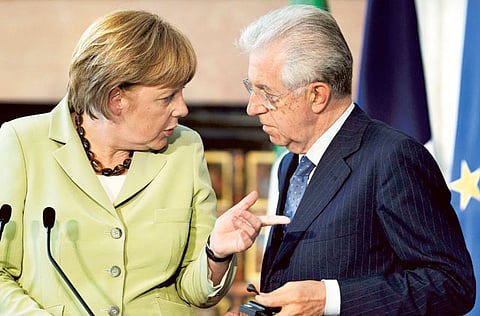Euro’s big four seek way out of crisis in Rome
Germany, Italy, France and Spain agree to cooperate on a €130b growth plan

ROME: Germany, Italy, France and Spain agreed to cooperate on a growth plan of as much as 130 billion euros (Dh598 billion) for the 17-nation bloc.
“This 130 billion euros is a strong signal,” French President Francois Hollande said at a press conference in Rome on Friday after a meeting of the countries’ four leaders. Hollande and Italian Prime Minister Mario Monti have been pushing for a collectively financed stimulus plan.
German Chancellor Angela Merkel and Spanish Prime Minister Mariano Rajoy agreed to the plan on Friday.
“We need more Europe,” Merkel said.
The leaders of Germany, France, Italy and Spain met in Rome on Friday seeking ways to restore confidence in the Eurozone ahead of a full EU summit this week, which Italy's prime minister called a defining moment.
Dangerously high Spanish borrowing costs have eased a little on market hopes for policy initiatives at the Brussels summit on June 28/29. If it falls short, Madrid may be pushed closer to eventually needing a sovereign bailout.
German Chancellor Merkel said she backed calls by European leaders for a growth pact of 1 per cent of the euro area’s gross domestic product (GDP). This would be a “good sign”, Merkel told reporters at a news conference on Friday in Rome with French President Francois Hollande, Spanish Prime Minister Mariano Rajoy and Italian Prime Minister Mario Monti.
"A large part of Europe would find itself having to continue to put up with very high interest rates that would then impact on the states and also indirectly on firms. This is the direct opposite of what is needed for economic growth," Monti said.
After a meeting of Eurozone finance ministers late on Thursday, IMF chief Christine Lagarde demanded rapid progress on a number of other fronts, raising the heat on Merkel.
Lagarde said a banking union was a top priority, alongside fiscal union and the principle of mutualising debt. Germany refuses to countenance common bond issuance and will not soften until economic union is complete. It is also opposed to the early introduction of a bloc-wide bank deposit guarantee scheme.
ECB move
The European Central Bank on Thursday said it will relax some rules on the collateral that banks can offer in exchange for central bank loans.
The ECB has cut the rating thresholds and amended eligibility requirements for some asset-backed securities, the Frankfurt-based central bank said in an e-mailed statement today. Residential mortgage-backed securities and loans to small and medium-sized enterprises rated at least BBB- at Standard & Poor’s will now be accepted with a valuation haircut of 26 percent, it said. The previous minimum rating on such securities was A-.
“They’ve had to acknowledge reality and they’re obviously having to accept lower-quality paper,” said David Owen, chief European economist at Jefferies Securities International in London. “It’s all part and parcel of the on-going stresses in the system.”
The ECB is acting to ensure banks have enough cash after the 17-member euro area’s debt crisis worsened, pushing up borrowing costs in nations such as Spain and Italy.
Meanwhile European Union finance ministers cleared the way for a financial-transaction tax to move forward in at least nine member states after Austria said deadlock among all 27 could threaten the euro area’s rescue fund. Germany and Austria today said a transaction tax needs to move forward in some form so their lawmakers will approve the 500 billion-euro European Stability Mechanism for it to start July 9 as planned. Austrian Finance Minister Maria Fekter urged nations to sign up to the next steps.
Sign up for the Daily Briefing
Get the latest news and updates straight to your inbox



